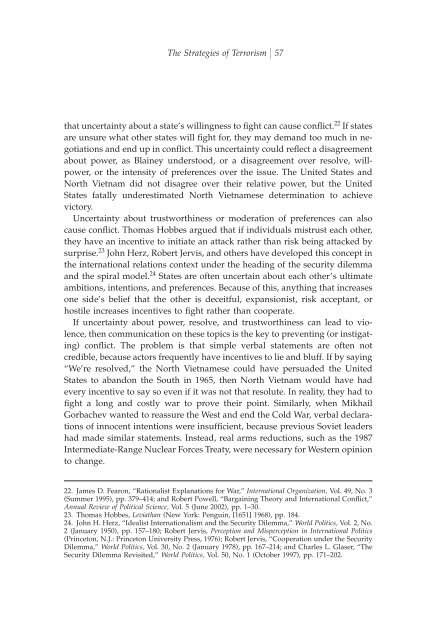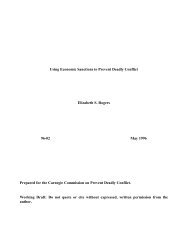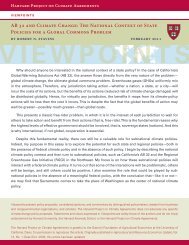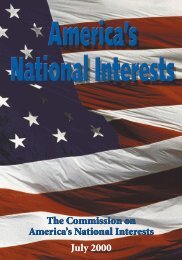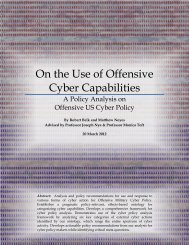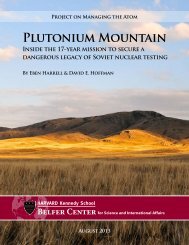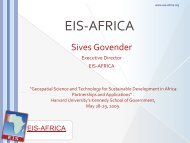The Strategies of Terrorism - MIT Press Journals
The Strategies of Terrorism - MIT Press Journals
The Strategies of Terrorism - MIT Press Journals
Create successful ePaper yourself
Turn your PDF publications into a flip-book with our unique Google optimized e-Paper software.
<strong>The</strong> <strong>Strategies</strong> <strong>of</strong> <strong>Terrorism</strong> 57that uncertainty about a state’s willingness to ªght can cause conºict. 22 If statesare unsure what other states will ªght for, they may demand too much in negotiationsand end up in conºict. This uncertainty could reºect a disagreementabout power, as Blainey understood, or a disagreement over resolve, willpower,or the intensity <strong>of</strong> preferences over the issue. <strong>The</strong> United States andNorth Vietnam did not disagree over their relative power, but the UnitedStates fatally underestimated North Vietnamese determination to achievevictory.Uncertainty about trustworthiness or moderation <strong>of</strong> preferences can alsocause conºict. Thomas Hobbes argued that if individuals mistrust each other,they have an incentive to initiate an attack rather than risk being attacked bysurprise. 23 John Herz, Robert Jervis, and others have developed this concept inthe international relations context under the heading <strong>of</strong> the security dilemmaand the spiral model. 24 States are <strong>of</strong>ten uncertain about each other’s ultimateambitions, intentions, and preferences. Because <strong>of</strong> this, anything that increasesone side’s belief that the other is deceitful, expansionist, risk acceptant, orhostile increases incentives to ªght rather than cooperate.If uncertainty about power, resolve, and trustworthiness can lead to violence,then communication on these topics is the key to preventing (or instigating)conºict. <strong>The</strong> problem is that simple verbal statements are <strong>of</strong>ten notcredible, because actors frequently have incentives to lie and bluff. If by saying“We’re resolved,” the North Vietnamese could have persuaded the UnitedStates to abandon the South in 1965, then North Vietnam would have hadevery incentive to say so even if it was not that resolute. In reality, they had toªght a long and costly war to prove their point. Similarly, when MikhailGorbachev wanted to reassure the West and end the Cold War, verbal declarations<strong>of</strong> innocent intentions were insufªcient, because previous Soviet leadershad made similar statements. Instead, real arms reductions, such as the 1987Intermediate-Range Nuclear Forces Treaty, were necessary for Western opinionto change.22. James D. Fearon, “Rationalist Explanations for War,” International Organization, Vol. 49, No. 3(Summer 1995), pp. 379–414; and Robert Powell, “Bargaining <strong>The</strong>ory and International Conºict,”Annual Review <strong>of</strong> Political Science, Vol. 5 (June 2002), pp. 1–30.23. Thomas Hobbes, Leviathan (New York: Penguin, [1651] 1968), pp. 184.24. John H. Herz, “Idealist Internationalism and the Security Dilemma,” World Politics, Vol. 2, No.2 (January 1950), pp. 157–180; Robert Jervis, Perception and Misperception in International Politics(Princeton, N.J.: Princeton University <strong>Press</strong>, 1976); Robert Jervis, “Cooperation under the SecurityDilemma,” World Politics, Vol. 30, No. 2 (January 1978), pp. 167–214; and Charles L. Glaser, “<strong>The</strong>Security Dilemma Revisited,” World Politics, Vol. 50, No. 1 (October 1997), pp. 171–202.


